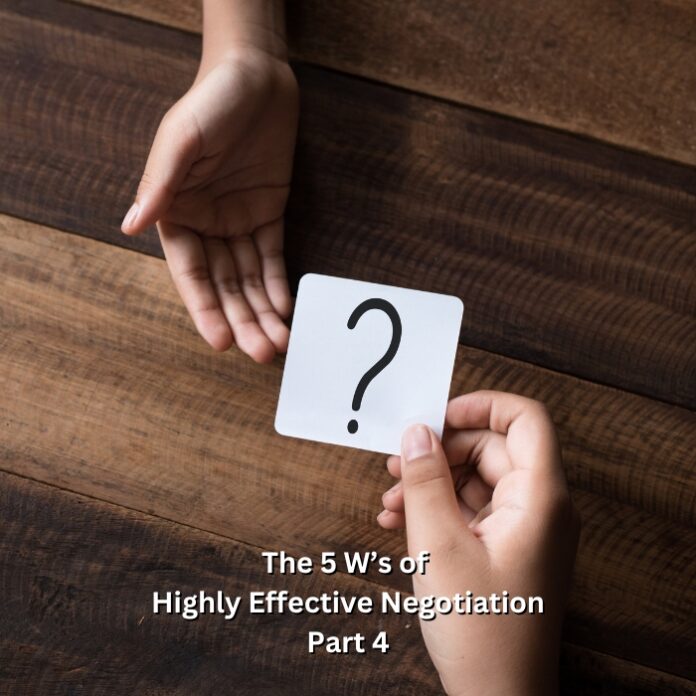Know the What
We’re nearing the end of our 5W journey. We’ve already explored how to use why, when and where as extra tools in your negotiation arsenal. If you recall, I suggested that negotiators who consider the 5 W’s, with intention, set themselves apart and better navigate the murky waters of mediation and negotiation. I hope you’re now seeing the potential power of this oft-ignored quintet and contemplating how to incorporate these ideas into your own negotiations. Today, we continue to examine these elements as we consider the all-important what of your negotiations.
This is perhaps the seemingly most obvious of the 5 W’s. What you negotiate about is typically forefront in your mind as you start the dialogue. We tend to have an ‘eye on the prize’ approach to our negotiations in life. I’d venture to guess, though, that your sense of the what of your bargaining is more shallow than it could be and doesn’t serve you as fully as it could. The what is often referred to as the ‘matter’ of the negotiations – the subject of your discussions, the issue(s) you’re addressing (the counter to the ‘means’ or ‘how’ of the process). Most people believe they have a clear sense of this. I’m going to ask you to consider digging a little deeper.
What do I want? What’s my priority? What does the other side want? What are their priorities? What can I offer? What should I offer? What’s my bottom line? These are the basic what questions that most people focus on. Our goal here, though, is to set you apart from ‘most people’. So let’s go a layer deeper. Ask yourself more what questions before you start bargaining. Here’s a few examples to get you thinking about the possible scope of the what: What leverage can I bring to bear? What strategy should I adopt? What can I say or do to be more persuasive? What unresolved personal baggage am I bringing to this discussion? What assumptions or biases do I bring that might impact on this negotiation? What other benefit(s) could potentially come from this negotiation? What impact will this negotiation have on this relationship, other relationships, future dealings, my sense of self, their sense of self, my reputation? These may seem frivolous but can be important game-changers when applied with intention. Consider, for example, if you’re negotiating with your child. You know you can easily maneuver the conversation to get what you want. But what if making your child ‘up their game’ while letting them ‘win’ the negotiation will be a great self-esteem boost and valuable life lesson for them and that the results matter very much to them but don’t really matter to you. Isn’t that valuable to factor in to how you conduct the negotiation? The same considerations can apply whether you’re dealing with your life partner, boss, employees or otherwise – in both your personal and professional negotiations.
In going deeper, I’d also suggest that at the outset of every negotiation, you consider what you think you’re negotiating for or about … and then take a beat to explore if perhaps there is something more that underlies the negotiation. Sometimes it really is just about the ‘ask’ on the table. But often, there’s something more behind the apparent issue being discussed. It’s worth asking yourself, “is this just about the matter or thing, or is something deeper at play here – i.e. is there an issue of power, control, reputation, respect, etc.” What’s motivating me or driving me on this point?
Once you’ve mastered that ability, it’s equally important to consider the deeper what vis-à-vis the other party. As we discussed in our why post [Part 1], think of the other party as an iceberg. What they present is only the tip. Ninety percent lurks under the surface – those all-important hidden or unstated needs. Ask yourself if their ‘ask’ is really what it seems at face value, or are deeper issues at stake for them as well? If the answer is ‘yes’ (i.e. you believe other motivators are likely at play) consider whether the other side is conscious of them. Their level of self-awareness can profoundly impact your negotiations. You can tailor your strategy and tactical decisions to the fundamental motivator of your negotiating partner. It’s a powerful tool. When you bring that level of insight, you can influence the negotiated outcomes by drawing on that deeper knowledge and using it to your advantage even (or especially) if the other party is unaware of their deeper drives.
Also consider what both yours and the other party’s state is at the outset of your bargaining. We discussed this under the when segment of this series [Part 2] in terms of whether the timing is right. As noted in that post, our state matters in negotiations, as most humans can’t avoid being affected by emotions. Be intentional about what state you want to be in to maximize your influence and effectiveness while simultaneously using the other party’s state to make strategic decisions about how to best approach the matter at issue.
During the negotiation, keep considering deeper-layered what questions. What are they saying (their words) versus what they’re really saying (their meaning)? What do their nonverbal cues tell me? By the same token, what messages am I sending through my tone, body language, facial expressions? What other interpretations could be read into my words? What seems to be landing well versus what’s causing resistance? What tactics should I adopt? What tactics are being used against me? What other opportunities are opening up, if any?
This article just scratches the surface of the multitude of what questions you could explore. My hope is to get you thinking about the possibilities they could open up for you. If you consider and apply the what of your negotiations with forethought and intention, you’ll have more influence in your negotiations and get better results. It’s that simple.





